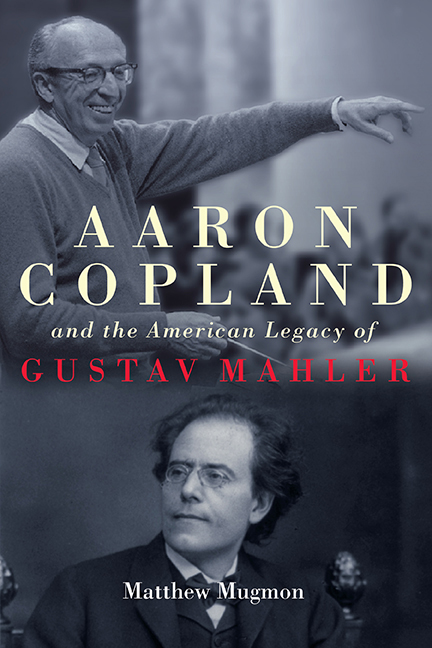Book contents
- Frontmatter
- Dedication
- Contents
- Acknowledgments
- Note on Musical Examples
- Introduction
- 1 Mahler and Copland in New York
- 2 Mahler in Nadia Boulanger's Studio and Beyond
- 3 Copland in Defense of Mahler
- 4 Mahler in Copland's Jewish Romanticism
- 5 Mahler's Idiom in Copland's “American” Sound
- 6 Copland, Koussevitzky, Mahler, and the Canon
- 7 Copland's Role in Bernstein's Mahler Advocacy
- Conclusion
- Notes
- Bibliography
- Index
- Eastman Studies in Music
3 - Copland in Defense of Mahler
Published online by Cambridge University Press: 18 September 2019
- Frontmatter
- Dedication
- Contents
- Acknowledgments
- Note on Musical Examples
- Introduction
- 1 Mahler and Copland in New York
- 2 Mahler in Nadia Boulanger's Studio and Beyond
- 3 Copland in Defense of Mahler
- 4 Mahler in Copland's Jewish Romanticism
- 5 Mahler's Idiom in Copland's “American” Sound
- 6 Copland, Koussevitzky, Mahler, and the Canon
- 7 Copland's Role in Bernstein's Mahler Advocacy
- Conclusion
- Notes
- Bibliography
- Index
- Eastman Studies in Music
Summary
It was on March 28, 1925, within a year of his return to the United States in June of 1924, that Aaron Copland attended the performance of Mahler's Second Symphony that prompted his letter to the New York Times. Copland used critics’ distaste for Mahler's music as a launching pad for a detailed defense of it: “The music critics of New York City are agreed upon at least one point—Gustav Mahler, as a composer, is hopeless. Year in and year out, the performance of one of Mahler's works is invariably accompanied by the same disparaging reviews.”
Such “disparaging reviews” came courtesy of prominent critics such as Lawrence Gilman in the New York Herald Tribune, Richard Aldrich in the New York Times, and Deems Taylor in the New York World. Gilman wrote that Mahler's “tragedy” was that despite his “tremendous reveries,” “mystical and passionate aspirations,” and “apocalyptic concepts,” he could not create “living and eloquent music.” Copland's letter to the Times was published a few days later, on April 5; but his was not the only voice in sympathy with Mahler. In the New York Telegram- Mail, the day after Copland's letter appeared, Pitts Sanborn wrote of the Second Symphony that “taken by and large, the work in question is impressive and engrossing…. We are now richer in our artistic knowledge and experience because of this occasion.” And the next year, a more elaborate endorsement of Mahler, by Allen Lincoln Langley, appeared in Musical Quarterly. There, Langley called Sanborn's positive review “the first temperate criticism of Mahler it has been my pleasure to see in a New York newspaper during the last five years.”
Taking note of the generally hostile critical environment toward Mahler, Copland embarked, in the remainder of his letter, on a careerlong advocacy of Mahler in which he navigated the challenges of pitching Mahler simultaneously as a progenitor of musical modernism and a paragon of romanticism. The Times letter offers a compelling starting point for examining this complicated mission. It featured a cluster of ideas meant to convince others that Mahler's music was worthwhile; these were an appeal to internationalism, an emphasis on Mahler's forward-looking orchestration, and a claim for Mahler's originality.
- Type
- Chapter
- Information
- Aaron Copland and the American Legacy of Gustav Mahler , pp. 41 - 66Publisher: Boydell & BrewerPrint publication year: 2019



